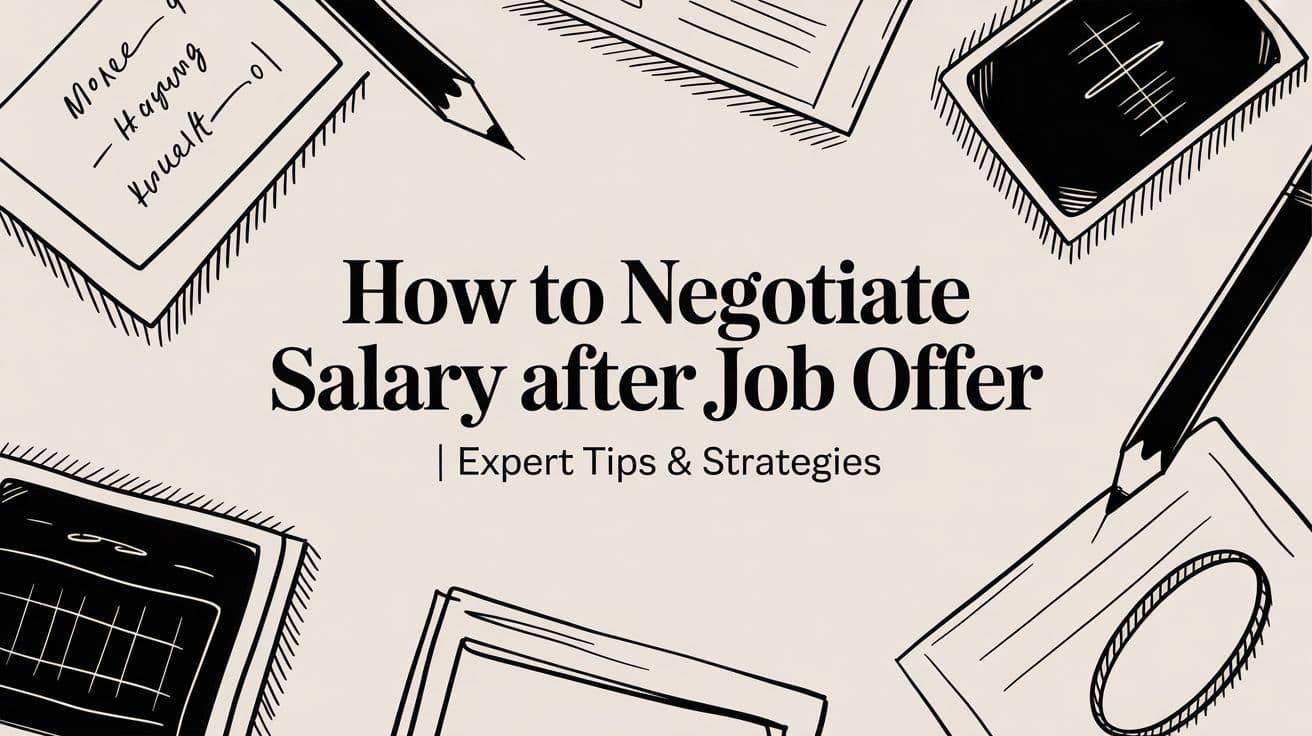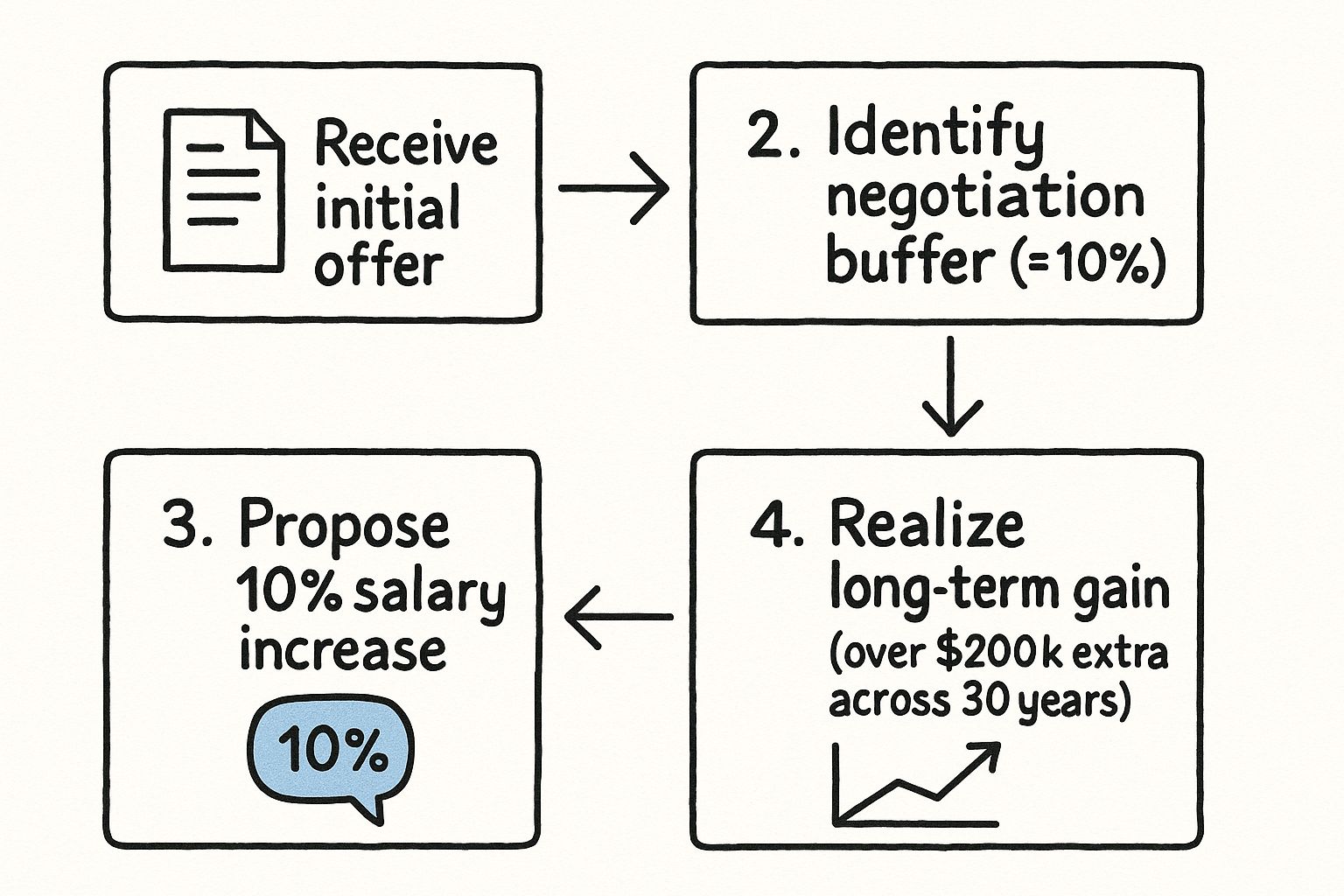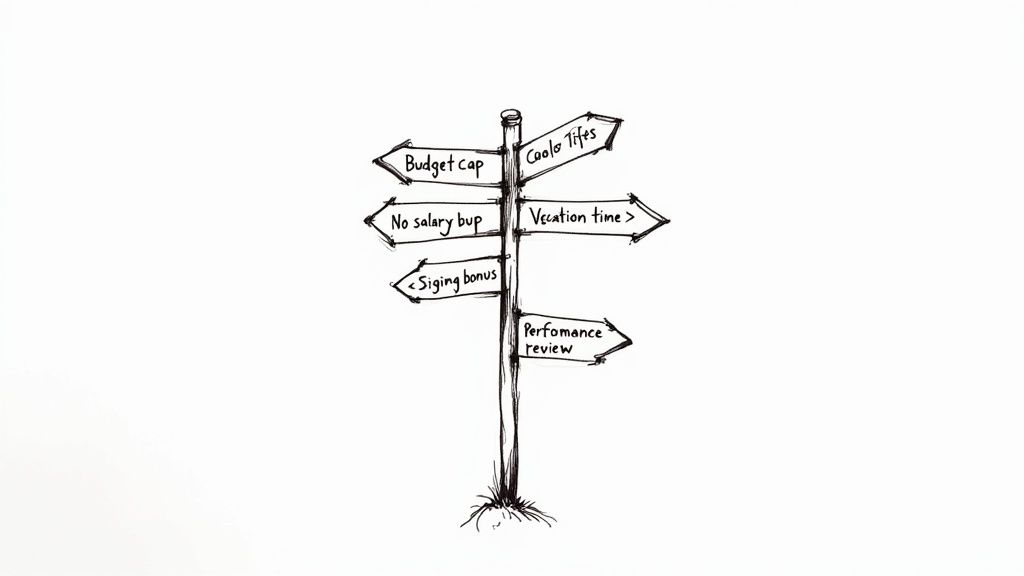How to Negotiate Salary After Job Offer | Expert Tips & Strategies
Learn how to negotiate salary after job offer with our proven tips, scripts, and strategies to secure the best compensation package. Read more now!

Let's be clear: negotiating your salary after getting a job offer isn't just okay—it's what smart professionals do. Think of it less like a confrontation and more like a final, collaborative conversation about what you bring to the table. A simple, well-researched counteroffer can have a massive impact on your financial future.
The High Cost of Not Negotiating
Getting that job offer feels great. It's validation. But accepting that first number without a peep can be one of the biggest financial mistakes you'll ever make. I get it—nobody wants to seem greedy or risk having the offer pulled. But here's an insider secret: most companies expect you to negotiate. They often have a built-in buffer in that initial number, just waiting for the conversation to start.
When you negotiate thoughtfully, you're doing more than just asking for money. You're sending a powerful signal that you know your worth and understand the market. It shows you have business sense, and it sets a confident, professional tone right from the start.
The Compounding Effect of a Higher Start
Here’s where it gets really interesting. That initial salary isn't just a number; it's the foundation for every raise, bonus, and even retirement contribution you'll get for years to come. A seemingly small bump now has a massive ripple effect.
Let’s say you negotiate just $5,000 more on your starting salary. Over a 30-year career, that single conversation could easily add up to hundreds of thousands of dollars in extra earnings. It’s not a one-time win; it’s a gift that keeps on giving.
This infographic breaks it down perfectly, showing how a simple 10% negotiation can lead to some seriously impressive long-term gains.

As you can see, one conversation can fundamentally change your lifetime earning potential.
To help you map out your strategy, think of the process in a few distinct phases.
Your Salary Negotiation Roadmap
This table gives you a quick overview of the key phases in a successful salary negotiation to guide your approach.
| Phase | Your Key Action | The Goal |
|---|---|---|
| Preparation | Research market rates, define your target number, and list your key accomplishments. | Enter the conversation with unshakable confidence backed by hard data. |
| Execution | Express enthusiasm, state your counteroffer clearly, and justify it with your value. | Present a compelling, professional case for why you deserve more. |
| Closing | Listen to their response, be ready to find a middle ground, and get the final offer in writing. | Secure the best possible package and lock it in officially. |
Following this roadmap keeps you focused and prevents you from getting flustered in the moment.
Overcoming the Hesitation Barrier
Even with all the benefits laid out, it's natural to feel hesitant. The data shows it, too—only 42% of early-career hires negotiate their first salary. But for those who take the leap, the payoff is huge. A staggering 78% of new hires who negotiate receive a better offer, and a big chunk of them get a straight salary increase. You can discover more insights about early career negotiation trends and see for yourself why it pays to ask.
The greatest risk isn't asking for too much; it's settling for too little. Every successful negotiation begins with the decision to advocate for your own value.
At the end of the day, this isn't just about the money. It's about being paid fairly for the skill, experience, and value you’re bringing to your new role. When you approach it as a collaborative process, you can land a compensation package that truly reflects what you're worth. That's how you start a new job on a foundation of strength and mutual respect.
Building Your Case Before You Talk Money

Here’s something most people don’t realize: a great salary negotiation is won long before you ever pick up the phone. When you walk into that conversation armed with confidence and hard data, you completely change the dynamic. This isn't about guesswork or just asking for more. It's about building an undeniable, evidence-based case for what you're worth.
Your first move is to establish a clear, data-backed salary range. This range becomes the anchor for your entire negotiation, giving you a realistic floor and an ambitious, but justifiable, ceiling.
Pinpoint Your Market Value
Before you can ask for what you're worth, you need to know what that is. I mean really know it. Generic national averages aren't going to help you here. You need targeted data specific to your skills, experience, and location.
- Use Multiple Sources: Never rely on just one website. I always cross-reference data from platforms like Payscale, Glassdoor, and Levels.fyi (which is a must for tech roles) to get a more accurate picture.
- Filter Aggressively: Be specific. Input your exact job title, years of experience, key skills, and your city or region. The more precise your filters are, the more reliable the data will be.
- Consider Company Size: A 50-person startup has a completely different pay structure than a Fortune 500 company. Most salary tools let you filter by company size—it’s a crucial detail that too many people overlook.
Doing this homework shifts the entire conversation. It’s no longer about "what I want" but "what the market dictates for this role with my qualifications."
Create Your Personal Value Proposition
Okay, you know your market rate. Now you have to prove you deserve to be at the top of that range. This is where you connect your past wins to the company's future needs. I recommend creating a simple document—I call it a "brag sheet"—that quantifies your successes.
For example, instead of a vague claim like "improved team efficiency," you get specific: "Implemented a new project management system that reduced project delivery times by 15% in six months." See the difference?
A negotiation backed by data isn't a demand; it's a business case. Quantifying your achievements transforms subjective claims into objective proof of your value.
This document becomes your cheat sheet for the negotiation call. It gives you concrete examples to justify your counteroffer and shows you're not just asking for more money—you're highlighting the return on investment they'll get from hiring you.
It's also smart to keep the current economic climate in mind. Recent data, for instance, shows that while salary increases are a bit below initial projections, they're still outpacing long-term averages. In the United States, planned salary bumps were projected at 3.9%, but actual increases landed at a solid 3.5%. This just reinforces why grounding your expectations in current, local benchmarks is so important. You can discover more insights about 2025 salary trends on wtwco.com.
Analyze the Full Compensation Package
Finally, remember that base salary is just one piece of a much larger puzzle. Before you even think about a counteroffer, you need to break down every single component of the offer they've given you.
- Bonuses: Is there a signing bonus on the table? What about annual performance-based bonuses? What are the targets?
- Equity: Are stock options or RSUs part of the package? Understand the vesting schedule.
- Benefits: Dig into the real value of the health insurance, retirement matching, and paid time off policies. A high-deductible plan can eat into a salary increase quickly.
- Perks: Does the company offer a professional development stipend, true remote work flexibility, or a wellness allowance? These have real monetary value.
Understanding all these elements gives you multiple levers to pull during the negotiation. If the company is firm on the base salary, you can skillfully pivot to negotiating for a signing bonus, an extra week of vacation, or an increased budget for professional growth. This level of preparation ensures you can have a flexible, productive conversation that ends with a total package you're genuinely excited about.
How to Frame Your Counteroffer

Alright, this is the moment of truth. All that research and prep work comes down to how you actually present your counteroffer. Get this right, and you’re on your way. Get it wrong, and the conversation can go south quickly.
The trick is to reframe the entire interaction. You're not making a demand; you're starting a collaborative conversation. Whether you’re on a call or typing an email, the formula is the same: lead with genuine excitement, pivot gracefully to the numbers, and root your request in the value you know you'll bring. You want to make it easy for them to say “yes.”
Opening the Conversation with Confidence
How you kick things off sets the entire tone. Whatever you do, don't just jump in with a number or an ultimatum. That's a rookie mistake.
Always start by expressing sincere thanks for the offer and reaffirming just how excited you are about the role. This small step works wonders. It shows the hiring manager you’re truly invested in the company and the position, not just chasing the highest bidder. It puts them at ease and reminds them why they wanted to hire you in the first place.
Only after you’ve set that positive foundation should you gently steer the conversation toward compensation.
Here's an example of what that sounds like in practice:
"Thank you so much for the offer! I am genuinely excited about the opportunity to join the team and get started on [Specific Project or Goal]. After reviewing the details and considering the scope of the role, I was hoping we could talk a bit more about the compensation. I'm confident we can land on a number that works for both of us."
See the difference? It's collaborative, not confrontational. You've framed it as a joint problem-solving exercise, which is exactly where you want to be.
Using Scripts and Phrasing That Work
It’s completely normal to feel a bit nervous, and having some proven phrases ready to go can be a huge help. You don't want to sound like you're reading from a script, but having a few go-to lines in your back pocket makes all the difference.
Here are a few ways to phrase your request, depending on the situation:
- When you have a specific number in mind: "I'm thrilled about this role. Based on my research for similar positions here in [City] and my experience with [Specific Skill], a salary closer to $XX,XXX would align more closely with my expectations."
- When you want to anchor high (and have the data to back it up): "Given my track record, like when I increased revenue by 15% in my last role, a salary in the $XX,XXX to $YY,YYY range would better reflect the value I'm prepared to bring."
- When you need to pivot to the total package: "I understand if the base salary has limited flexibility. If that’s the case, could we explore a signing bonus or additional vacation days to help bridge that gap?"
Here’s a pro tip: once you’ve stated your number, the most powerful thing you can do is stop talking. Seriously. Make your case clearly and confidently, then pause. Let the silence hang for a moment. This gives the hiring manager space to think and demonstrates that you’re confident in your request.
Maintaining a Productive Dialogue
The hiring manager’s response is the next crucial step. Listen carefully. Are they talking about budget constraints? Internal salary bands? Understanding why they are pushing back (or agreeing) is key to your next move.
If the initial answer is "no," don't panic. It's rarely the end of the conversation. Keep your tone warm and inquisitive, not defensive.
You could respond with something like, "I appreciate you sharing that context. Could you help me understand a bit more about how the compensation for this role was determined?" This keeps the door open and can lead to creative solutions you hadn't even considered.
Throughout the back-and-forth, stay confident and positive. A successful negotiation is a real-time demonstration of your communication and problem-solving skills—the very same skills you’ll be using on the job. By framing your counteroffer with care, you’re not just getting paid what you're worth; you're kicking off your new job on a foundation of mutual respect.
What to Do When They Say No

So, you’ve laid out your case, but the hiring manager comes back with that classic line: "I'm sorry, but this is our best and final offer." It’s easy for your heart to sink a bit, but don't panic. This is rarely the end of the road. More often than not, it's a signal to get creative.
When you hit a wall, whether it's a firm "no" or an explanation about tight budgets, the trick is to keep the tone collaborative. You want to gently pivot the conversation away from a single number—the base salary—and toward the entire compensation landscape. This is where all that homework you did on the full benefits package really pays off.
How to Respond to Common Pushback
Let's game plan for the most common roadblocks you'll run into. Hiring managers have their go-to reasons for not budging, usually citing internal policies or budget limits. Here’s how you can handle them.
When they say: "Our budget for this role is capped at $X."
- You can reply: "I understand that budgets can be rigid. Given that, could we explore other parts of the compensation package to help bridge the gap?" This shows you’re a flexible problem-solver, not just focused on one number.
When they say: "We need to maintain internal equity with our current team."
- You can reply: "I completely respect the need for internal consistency. Perhaps we could look at a one-time signing bonus or guarantee a performance and salary review in six months? That way, we aren't disrupting the existing salary structure."
When they say: "This is the top of the salary band for this position."
- You can reply: "Thank you for clarifying. If the base salary is firm, I'd love to discuss the possibility of adding an extra week of vacation time or increasing the professional development budget."
This approach turns a potential dead end into a productive brainstorming session. It proves you're committed to finding a win-win solution.
Shifting from Salary to the Full Package
If the base salary truly is set in stone, it’s time to move on. Your total compensation is a blend of financial and non-financial perks, all of which hold real value. Think about what would genuinely make a difference for you.
Could it be one of these?
- A signing bonus: This is often the easiest "yes" for a company, as it's a one-time payment that doesn't impact long-term salary bands.
- An early review: Ask to lock in a performance and compensation review after six months instead of waiting the standard year.
- More vacation time: An extra week of paid time off can be just as valuable as a few thousand dollars, especially when it comes to work-life balance.
- A professional development stipend: Secure a bigger budget for courses, certifications, or conferences that will help you grow in the role.
Don't let a "no" on salary be the end of the conversation. Reframe it as the beginning of a creative discussion about the total value you can both agree on.
Remember, negotiation is the new normal. Research shows that most professionals who negotiate end up with a better offer—in fact, about 79% of Gen Z, Gen X, and Boomers report a positive outcome. Employers are getting used to it, too, with over half now open to negotiating even for entry-level jobs. You can read the full research about salary negotiation success rates to see just how common this has become.
Coming into these conversations with a flexible and creative mindset is your best bet for walking away happy.
Getting It All in Writing
You've done it. You’ve navigated the back-and-forth, and the hiring manager has verbally agreed to your new compensation package. It’s a huge relief and definitely a moment to celebrate, but hold on—we're not quite at the finish line yet.
A verbal agreement is great, but it’s not a legally binding offer. Think of it as a handshake agreement that needs to be formalized.
Don't Jump the Gun
This is probably the most crucial piece of advice I can give you at this stage: do not resign from your current job. Don't even think about it. Don't stop your other interviews. Nothing is final until you have a revised, formal offer letter in your hands (or, more likely, in your inbox).
I've seen it happen before. Wires get crossed, someone in the approval chain goes on vacation, or a verbal promise is simply misremembered. The written offer is your safety net, making sure everyone is absolutely clear on the terms before you make any career-altering moves.
Scrutinize the Details
When that updated offer letter finally arrives, it's time to put on your detective hat. It's easy to get excited and just scan for the new salary number, but you need to read every single line.
I recommend making a quick checklist of everything you discussed and comparing it against the document.
- Base Salary: Is it the exact number you agreed on?
- Bonuses: Is the signing bonus there? Is the performance bonus potential and its structure spelled out clearly?
- Equity/Stock Options: If this was part of the deal, are the number of shares and the vesting schedule correct?
- Time Off: Did you negotiate an extra week of vacation? Make sure it's reflected in the PTO policy description.
- Title and Start Date: Double-check these basic but important details.
- Special Perks: Is that remote work agreement or the professional development stipend you asked for actually included?
If you spot an error or an omission, don't worry. It's almost always an honest mistake, not a bait-and-switch. Just send a brief, friendly email to point it out.
Something like this works perfectly: "Thanks so much for sending this over! I'm thrilled to get started. I did notice the start date is listed as the 15th, but we had discussed the 22nd. Could we please get that updated?"
Remember, the way you handle this final step sets the tone for your new professional relationship. Getting a clear, accurate written offer shows you're thorough and establishes a foundation of mutual respect.
Once everything is corrected and looks perfect, it's time to make it official. Send a clear, enthusiastic acceptance email. This formally closes the negotiation and lets you start your new chapter on a fantastic, professional note.
Common Salary Negotiation Questions
Walking into a salary negotiation can feel like navigating a minefield. You've got questions, and you need straight answers to build the confidence to get what you're worth. Let's break down some of the most common hurdles you'll face.
What If They Ask for My Salary Expectations Early On?
Ah, the classic trap. It’s one of the first moves you’ll see, but you don’t have to play their game and give up a number right away. The key is to deflect politely.
Instead of locking yourself into a figure before you even know the full scope of the job, try this: "I'd prefer to learn more about the role and its responsibilities before discussing specific numbers, but my research shows that similar positions in this area are in the $XX,XXX to $YY,YYY range."
This response does two things perfectly. It shows you’ve done your homework, but it also keeps you from being anchored to a low number before you have a formal offer in hand.
Can a Company Actually Rescind an Offer?
This is the number one fear for most people, but let’s put it to rest: it is extremely rare. As long as you approach the conversation professionally, respectfully, and with solid market data to back you up, a company isn't going to pull the rug out from under you.
Think about it from their perspective. They've already poured a ton of time and resources into recruiting, interviewing, and choosing you. A polite negotiation is an expected part of the hiring dance, not a reason to start all over. In fact, a huge 87% of employers have said they've never withdrawn an offer just because a candidate tried to negotiate.
The goal of a negotiation isn't to issue demands; it's to start a professional dialogue about your value. A reasonable counteroffer signals confidence, not greed.
How Much More Should I Ask For?
There’s no one-size-fits-all answer here, but a good rule of thumb is to aim for 7-15% above their initial offer. This is widely considered a reasonable and professional range.
If you plan to ask for more than that, you need a rock-solid case. This could be a competing offer, exceptional skills that are hard to find, or clear data showing their offer is significantly below the market rate.
One pro tip: always counter with a specific number, not a range. Asking for $82,500 sounds like you've done precise calculations, whereas asking for "$80,000 to $85,000" just invites them to offer you the bottom of your own range.
Should I Negotiate Over Email or Phone?
I almost always recommend a phone or video call. It's just so much easier to build a genuine connection, gauge their reaction, and have a real back-and-forth conversation. Your tone of voice can communicate excitement and collaboration in a way that plain text never can.
That said, context is everything. If the entire hiring process has been through email, or if that's the channel the hiring manager clearly prefers, then sticking to email is fine. A well-written email can get the job done, just make sure to keep your tone positive and your reasoning crystal clear. The goal is to adapt to the communication style they've already set.
Feeling prepared is half the battle in any negotiation. At SalaryCoach.ai, you can practice these exact scenarios risk-free with an AI coach that gives you instant feedback. Stop guessing and start rehearsing for the salary you deserve. Try your free practice negotiation at SalaryCoach.ai.
Article created using Outrank
Ready to Practice Your Negotiation Skills?
Start practicing with our AI coach and build confidence for your next salary negotiation.
Start Practice Call